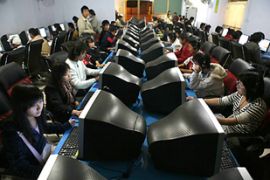China blocks Youtube access
Bar on video-sharing site in apparent effort to control information on Tibet protests

“We are relying on tourists, citizens sending information out.”
The bar on Youtube is not unusual with Chinese authorities regularly blocking access to foreign news sites and even social networking sites at politically-sensitive times without explanation.
The protests in Tibet come at a particularly sensitive time for Beijing in the lead up to the Olympic games.
China‘s state-controlled media has restricted its coverage of the Tibetan unrest to scenes of rampaging mobs, without any footage of the security forces’ response.
Despite assertions by China‘s leadership that it is becoming more open, Beijing maintains tight control of the country’s media, and any expressions of major social dissent are generally kept under wraps.
Out of bounds
As part of a pledge for greater openness, Beijing introduced new regulations at the beginning of last year allowing foreign journalists to report throughout the country without gaining the prior approval of local officials.
 |
|
State TV has shown footage of rioters but |
Tibet, however, remains out of bounds for foreign journalists unless they travel there as part of tightly-controlled media excursions in the company of government minders.
Tibet‘s physical remoteness and Beijing’s extreme sensitivity over the territory have made it difficult for news organisations to gain detailed information about the demonstrations.
Tibet’s government chief Qiangba Puncog has said that 13 civilians were killed by rioters, while Tibetan groups in exile say up to 100 may have died, many killed by security forces.
Neither figure can be independently confirmed.
Online crackdown
Civil rights activists had hoped that growth of the internet in China would lead to a renaissance of free expression and popular calls for greater democracy.
But according to the advocacy group Reporters Without Borders, the Chinese government has stepped up its crackdown on online dissent, particularly so in the run-up to the Olympics.
Last year, the group says, 51 online dissidents were jailed and more than 2,500 websites were blocked.
Chinese leaders encourage internet use for education and business but use filters to block access to material considered subversive or otherwise detrimental to society, such as pornography.
Operators of China-based online bulletin boards are required to monitor their content and enforce censorship while foreign websites run by news organizations and human rights groups are regularly blocked if they carry sensitive information.
The government is also believed to maintain an internet police force of more than 30,000 officers keeping watch for anything undesirable appearing online.
Critical comments on internet forums are usually erased within minutes.
But whether authorities can continue to keep control of the explosive growth of the internet in China remains an open question.
China has at least 210 million internet users, according to the government, and is expected to soon overtake the US to have the biggest online population.